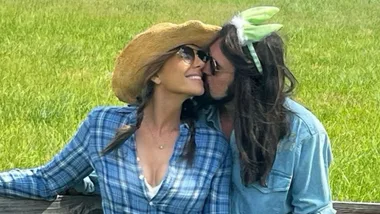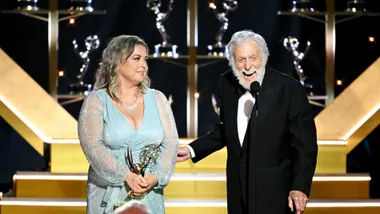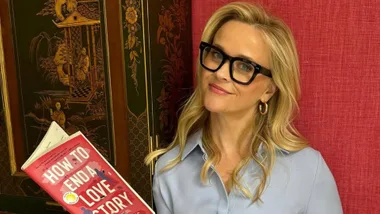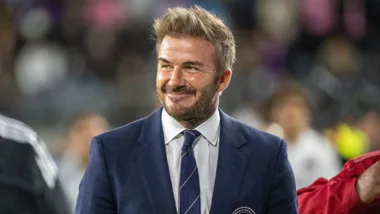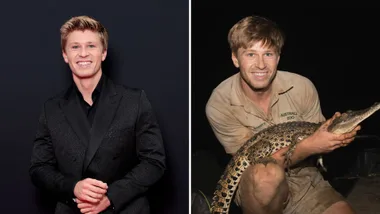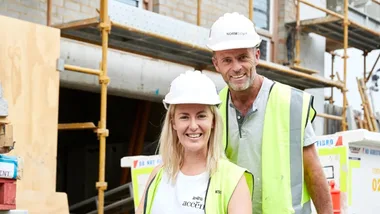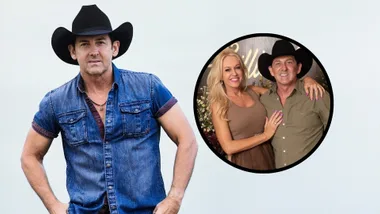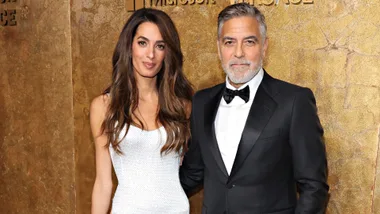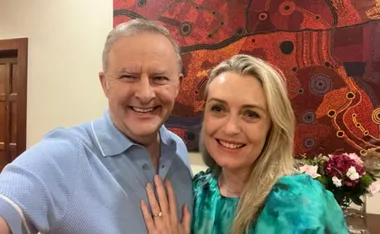Exclusive interview with LIANE MORIARTY, author of the Great Read, THREE WISHES (Pan Macmillan Australia), in the October issue of The Australian Women’s Weekly.
**Q You have an unusual first name?
A** Mum read it in a book somewhere, I think it’s German.
**Q You have described yourself as an annoying little girl and said that friends had to hide their books when you arrived – did you hog them?
A** Yes and I wouldn’t talk to anybody. My mother got annoyed about that, too. I just sat there and read all day. You couldn’t get the book off me. Enid Blyton books in particular, this girl used to hide from me.
**Q. So you were a voracious reader from very early on?
A** Yes. I read till I’m ill – you know how you can read so much you get a headache. Just gobbling it up. I read like I eat, too much and too fast.
**Q. When did you write your first story?
A** I was 10. My first published story was Summer Is Coming and it appeared in the Sun Herald comics, and I remember my teacher telling me, “Liane, I saw your story in the paper at the weekend.” It was the most wonderful moment. Mum still has it and shows it to people. Still thinks it was the best thing I’ve ever written, like I peaked when I was 10! In sixth grade, we had a wonderful teacher every Friday afternoon. She’d give us a topic for creative writing and we’d write away. It’s hard to get back that unselfconscious way of writing. When you’re writing purely for the joy of writing. I don’t think I’ve got that back yet.
**Q. This teacher was obviously crucial in your development as a writer?
A** I think she was. I was worst in the class at gym, best in the class at writing.
**Q. Did you nurse an early ambition to write?
A** It definitely was an ambition. I remember thinking as a child you needed to be sensible and I remember writing, when asked, ‘What do you want to be when you grow up? A teacher.’ Then I put in little writing down the bottom, ‘Not really, I want to be a famous writer’. I don’t know why I couldn’t have said that.
**Q. You obviously didn’t think it was a legitimate occupation?
A** I must not have and it must have been something to do with me eventually going into copywriting and the marketing – telling people what they want to hear.
**Q. What do your parents do for a living?
A** Dad’s in mapping and surveying, Mum’s a mum.
**Q. She’d need to be with 6 children.
A** Yes and then she went onto foster 40 children. It’s short-term fostering.
**Q. Mostly babies?
A** Yes, she just loves babies, she did a lot of the pre-adoption babies. The mothers would get the chance to change their mind in that six week period. But there’s not so many adoptions happening nowadays so now it’s more where something’s happened or there’s a problem.
**Q. You must have had perpetual babies in the house?
A** We did. And now poor Mum still hasn’t got any grandchildren. Still has to keep going for the foster babies.
**Q. What impact did the fostering have on you growing up?
A** We loved the babies, but we were quite spoiled as we got the fun part. We got the cuddles and smiles, we didn’t get up at night for them. So we just enjoyed the babies. I think perhaps it did give us a realistic idea of what’s involved in having babies and perhaps that’s why(laughing) none of us have one. But we do love them. And we will have them.
**Q. You’re the eldest of six?
A** Yes, I have four sisters and one brother.
**Q. Did growing up in a big family equip you for going out in the world in any particular way?
A** It was great fun growing up with six children. My youngest sister, who is 21, has been saying things like I want to have six children. And we’ve said the fun part was for us, it wasn’t fun for Mum. There was always somebody to play with, but me being the eldest, I was used to people doing what I told them to do. So I think I was a manager of a team for a quite a while, so I’m quite a good manager. It’s interesting to me how only children work out who they are. Because growing up with so many sisters, it makes you realise somebody was the tidy one and somebody was the untidy one and we all enjoyed the differences. I enjoyed writing about that in the book – the roles that you play in the family
**Q. The triplets in your book were simply a device and not based on reality?
A** I really made the whole book up as I went along. That very first scene I just had three women, I didn’t even know they were going to be triplets and then all of a sudden they were. I’ve got a thing about twins and triplets. I’m really interested in them. If I meet one, I love to hear about them. There were triplets at school and I wasn’t good friends with any of them, but I watched them from afar. I can still see their faces in my mind. Especially identical twins, they really fascinate me. In fact I want to have twins. I should know better, but I’ve got this thing that I’d love to have twins.
**Q. Are there twins in the family?
A** No (laughing) there’s no reason in the family for me to have twins. I feel like if I talk about it a lot it might happen. Apparently though, as you get older, you’ve got higher chances of having twins. That’s why there’s more twins around now because we are all having babies much later.
**Q. Three Wishes was completed as a part of your Masters degree – what kind of story did you set out to write?
A** I don’t know that I did. You didn’t have to write a whole novel to finish your degree. You only had to write 30,000 words, so I was just being a show-off, really. I didn’t really plan anything. I just wrote as I went along. And I tried not to think too much about it so that I wouldn’t be overcome by fear.
**Q. Your relationship with your siblings provided a lot of material for Three Wishes?
A** Yes, certainly the way I interact with my sisters definitely influenced the book. I really enjoyed writing the dialogue between the sisters.
**Q. Their relationship was very real – it was rocky, alliances changed, and there were arguments. They weren’t like idyllic sisters who got on perfectly.
A** Exactly, although certainly I think because we’re not triplets, because we’re not the same age, there isn’t as much conflict as there was in the book. Now we’ve grown up, there’s no fighting over bathrooms or stuff like that. Whereas the Kettle girls are a little bit over the top and very, very close. We’re close, but we don’t fight much any more.
**Q. Was the famous birthday scene based on real life?
A** No. And the difference is that if it happened to us we’d be quietly vicious, we wouldn’t be loud.
**Q. Was knowing a literary agent because of your sister, who is a very successful children’s writer, a big help?
A** It’s definitely an advantage.
**Q. Was there a big waiting period to hear if the book was to be published?
A** I didn’t have to wait very long at all. It was a matter of weeks. Cate at Pan Macmillan read it over a weekend and made her offer on the Monday, so it all happened very quickly. I was lucky. The agent called half way through and left a message on the answering machine. She said she loved it and that I’d achieved something “really special”. I made my girlfriend listen it. I remember her standing there and grabbing my arm with excitement.
**Q. The title Three Wishes is based on the opening birthday celebration?
A** Yes and it also refers to what the three women want in their life – they’re all wishing for different things.
**Q. Is there anything else I should know?
A** I guess the only thing I was practising to say to you (giggling), was what I was trying to get across in the book was this idea of what makes you who you are. So there’s the whole nature versus nurture thing. Is it in your genes? Or your environment and that whole thing of your personality being formed by the time you’re seven or by the time you’re three. So I had things happening to the girls before they were seven. They are all affected by the divorce. And if that means that’s your personality settled by then, can you then change your personality? So I’ve got Lyn reading self-help books, but things obviously happen to you in later life, like Gemma being in an abusive relationship, or having a terrible secret, so how does that affect you? And also how you appear to other people, which is why I have those scenes of other people, strangers watching from afar and making their own observations. And the way you perform for others. And of course in relationships, the roles that you play. And how you get stuck being a certain sort of way in each new relationship.
**Q. Part of the Three Wishes is about divorce and the way it bruises children – is it based that on any real life event?
A** Only my own divorce. I was the only person I knew to get divorced, so I was very surprised. I think everybody was surprised. You’d think we wouldn’t be, with divorce so common.
**Q. When it happens to you, it is a shock.
A** That’s right, I still can’t quite believe it even when I say it. I never thought I would be the sort of person to say, ‘I got a divorce’.
**Q. I think, too, if you come from parents who have had a long, good marriage, your expectations are that you’ll have the same thing.
A** Yes, that’s right. And I think it did impact on my family too.
**Q. Are you still working as an advertising copywriter?
A** Yes. I keep thinking that I should start saying ‘no thank you’ to clients, but it seems like bad luck or who do I think I am? I will eventually, though, because I want to write the next one. I’m freelance and that’s why it’s hard because the work’s always been up and down and it goes against the grain to turn it down.
**Q. When did you begin working as a copywriter?
A** 1985. I was 18 and dreamy, and someone suggested I try it. I’d done a course and coming up with the creative idea that also benefits a product was something I understood – it appealed to me. I liked the marketing side and also being able to come up with something creative. I thought yes, I get that. Then I got more caught up with the business, I did a business degree with a marketing major. I got a bit corporate. I think I lost myself for a while – no, I didn’t. I just discovered another part of myself for a while.
**Q. Any well known ad campaigns you’ve been associated with?
A** No, I wish I could say I have. I remember I was at a dinner party one night and I mentioned an ad I’d worked on and a woman said, ‘I HATE that ad’. She didn’t seem to realise that that would be insulting. Most of the TV ads I’ve done were for a phone company which did really well as a company. In a way, it was too funny to be hurtful.
**Q. I imagine you’ve written about a lot of different products – you mention writing on the back of cereal boxes?
A** Yes and I’ve written about everything from cook-tops to cables, and some amazingly technical stuff about a tender for a Navy, for submarine stuff – didn’t understand a word, to furniture and beach holidays.
**Q. Are you still enjoying it?
A** I do. I still enjoy dealing with the client and having a project and then it’s done. When I went quiet for a couple of weeks, I went a bit nutty.
**Q. How old are you?
A** 36.
**Q. Did your sister, who is an author, inspire you?
A** Yes, when we were little we both wanted to write and she went ahead and did it! Wrote a book and had fantastic success with it. I was very proud of her, but also very envious. I think you think real people don’t actually write books. You dream about it, but that’s all. I’ve got a little circle of friends who are now all writing books, definitely thinking that if the Moriarty clan can write books, anybody can. Without them actually saying that, I think that’s what they’re thinking.
**Q. Any writers in your background?
A** Mum and Dad tell a good story and write funny letters and emails. They’re both taking credit for it. I think it does come from both of them. My grandma tells a lovely story and often writes down little stories.
**Q. Paternal or maternal?
A** Maternal. She’s 80.
**Q. How would you describe Three Wishes?
A** I think I’d say first of all it’s an easy, enjoyable read. I read very fast and I think as a result I’ve written a book that people read very quickly. And, hopefully, it’s a book they can’t put down. That’s the comment I’ve loved hearing most from friends. The sort of books that I like to read are the ones that are funny and touching. That odd cliché, it makes you laugh and it makes you cry.
**Q. How would you classify the book?
A** Originally, I would have said chick lit with grit, but my publisher said chick lit has become a brand, normally by a UK writer about a single girl finding love, so I stopped calling it chick lit and she said to call it women’s fiction.
**Q. Education?
A** Went to Mt Benedict High School, Pennant Hills, did my degree at UTS and my Masters at Macquarie University.
**Q. Do you have a partner?
A** Yes. I was married for four years, so I have a divorce in the background. And I’ve been with my partner for coming up to three years.
**Q. What does he do?
A** He works in IT. And he says he’s going to write a book now, too.
**Q. His name?
A** Eric.
**Q. Star sign?
A** Scorpio.
**Q. Nominate a couple of writers you really like?
A** Anne Tyler. Carol Shields.
**Q. When you’re not writing you’re…
A** Reading in the bath or eating.
**Q. What really annoys you?
A** People fast forwarding the previews when you’re watching a video. I love the previews.
**Q. Favourite movie?
A** Bread and Tulips
**Q. Describe yourself in three words?
A** Untidy, self-indulgent, neurotic.
**Q. Other interests?
A** Snow skiing. I love snorkelling, but my boyfriend’s into scuba diving, so if the relationship is going to continue I’m going to have to learn to scuba dive.
**Q. And he’s going to have to learn to enjoy snorkelling.
A** Yes, that’s true. We live by the sea in Sydney, it’s right outside our front door, so we can go snorkelling easily. And bushwalking, I love going for walks.
**Q. You sound contented with your life at the moment.
A** I’m probably the happiest I’ve ever been. For a while there all I wanted was boy, book, baby. The three B’s. But no, I’m very, very happy, I’ve got the two out of the three B’s. And that’s pretty good.

